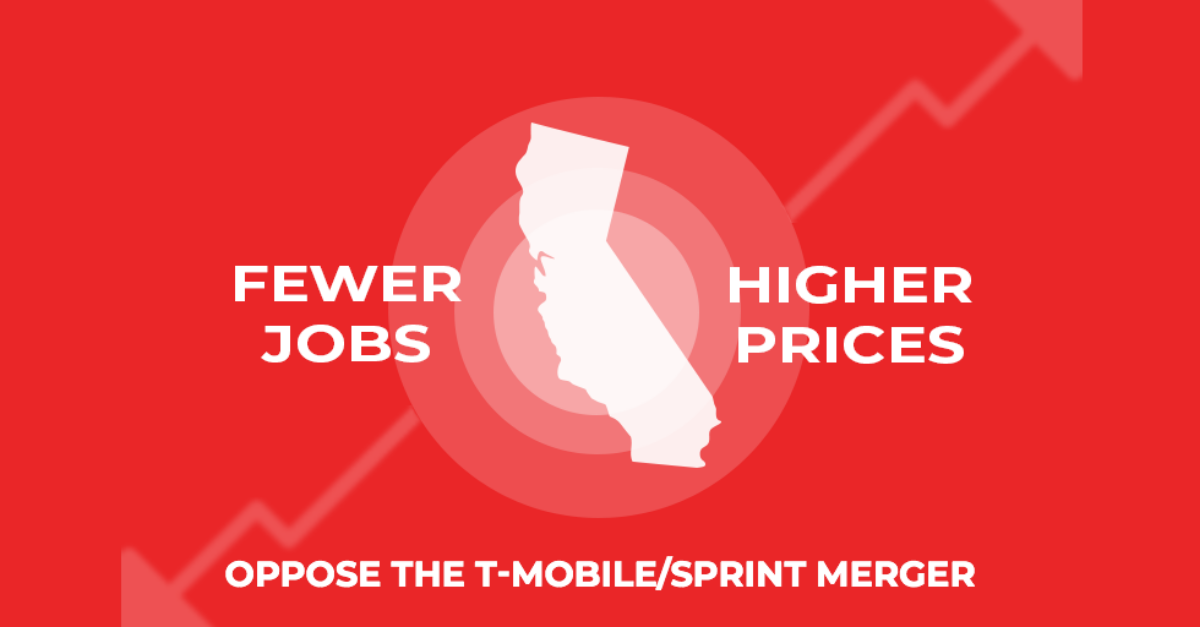The proposed T-Mobile and Sprint merger is bad news for workers and consumers in California and across the country. While T-Mobile and Sprint are making vague promises that the merger will create thousands of jobs in the U.S., the data and the companies' track records tell a different story.
The merger would result in job loss for California workers, increased prices for California consumers, and shuttered stores in urban areas of the state, while still leaving rural parts of California without access to high-speed broadband.
CWA's comprehensive economic analysis finds that the merger will result in the loss of 30,000 U.S. jobs, including 3,342 jobs lost in California.
| U.S. Census-defined urban area | Number of existing stores in | Projected store closures in | Projected retail jobs lost (net) in |
| Los Angeles-Long Beach-Anaheim, CA | 1,273 | 419 | -1,645 |
| Riverside-San Bernardino, CA | 227 | 76 | -273 |
| San Diego, CA | 272 | 63 | -247 |
| Sacramento, CA | 160 | 39 | -93 |
| Fresno, CA | 68 | 22 | -71 |
| Indio-Cathedral City, CA | 42 | 18 | -63 |
| Hemet, CA | 22 | 12 | -51 |
| Lancaster-Palmdale, CA | 41 | 16 | -48 |
| Modesto, CA | 37 | 10 | -44 |
| Victorville-Hesperia, CA | 35 | 10 | -35 |
| Other cities in the state | 1,064 | 217 | -772 |
| TOTAL FOR THE STATE | 3,241 | 902 | -3,342 |
Higher prices for California consumers.
Eliminating the head-to-head competition between T-Mobile and Sprint would mean higher prices for California consumers, especially price-conscious customers of their prepaid carriers Boost (Sprint) and MetroPCS (T-Mobile). Economists estimate that prices for pre-paid plans will rise by 15.5% and by 9.15% for post-paid plans. This means that the proposed merger would negatively impact many low- and moderate-income consumers.
Reduced wireless competition in California.
The merger raises real competitive concerns. The data shows that a dissatisfied T-Mobile customer is most likely to switch to Sprint, and vice versa. After the merger, this choice goes away, reducing each company's incentives to keep prices low and offer new services. In addition, the new T-Mobile would control a vast amount of spectrum, the key input for wireless services. When a company holds more than 1/3 of the spectrum in a local market, the FCC sees competitive concerns. In California, the New T-Mobile would exceed the FCC spectrum screen in 52 out of 58 counties in the state, including where 99.2% of California's population lives.
Rural California would still be left behind.
The merger would still leave the majority of rural Americans without access to high-speed broadband and wouldn't dramatically improve the rural offerings compared to what the two companies would provide as standalone competitors. The companies' own filings with the FCC show that 46 million Americans, mostly in rural areas, will be left without access to the New T-Mobile's high-capacity network.
The merger is not necessary for deployment of next generation 5G wireless.
T-Mobile and Sprint tell regulators that they need the merger to build 5G wireless. But the companies sing a different tune when talking to investors. As recently as October 2018, T-Mobile told investors it will build 5G as a stand-alone company in "hundreds of cities" across the U.S. in 2018 and a national 5G network in the first half by 2020. The same month, Sprint announced it will launch its 5G network in the first half of 2019. These companies do not need to merge to deploy 5G.
Workers' wages will suffer, too.
The proposed merger will leave retail wireless workers worse off by reducing the number of national wireless retail employers from four to three. Fewer employers means reduced competition for labor, which leads to lower wages and reduced benefits. Collective bargaining can help counter this effect, but T-Mobile and Sprint have long histories of violating workers' rights.
T-Mobile and Sprint have long histories of violating workers' rights and offshoring U.S. jobs.
Both companies have unlawfully resisted their employees' attempts to organize a union and collectively bargain for higher wages and other terms of employment. T-Mobile has been found guilty of violating U.S. labor law six times since 2015 and has been subject to approximately 40 unfair labor practice charges since 2011. Both Sprint and T-Mobile also offshore a significant portion of call center work to Philippines, Guatemala, Honduras, India, Mexico, Panama, the Dominican Republic, Costa Rica, and Canada.
The Bottom Line? Regulators should not approve the merger without verifiable and enforceable commitments on jobs and workers' rights from T-Mobile and Sprint.
Unless the companies agree to ensure that no T-Mobile or Sprint employees will lose their jobs as a result of this transaction, commit to returning all overseas customer call center jobs to the U.S., abide by all labor and employment laws, allow their employees to form a union of their own choosing, free from any employer interference, regulators should not approve this merger.

